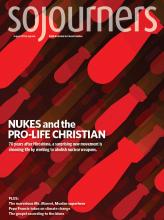THE DOG DAYS OF SUMMER can make for a preaching desert without an oasis in sight. This can be a fine time to take a vacation from the lectionary. Huge swaths of scripture go untreated otherwise—the entire Samson cycle, most of the cursing psalms, most of the gospel of John. One friend spends a portion of every year preaching through blockbuster movies and how they intersect with the scriptures. Another devoted a preaching series to favorite children’s books.
Here in August the lectionary itself seems to take a vacation, visiting the discourse about bread in John’s gospel, inviting us to see every bit of bread, every bite of food, as filled with Jesus. Texts about water invite us to see all water as a sign of the God who creates us in the water of a womb and gives water for our salvation in baptism (an especially apt teaching point for those still sandy-toed from the beach).
A friend’s pulpit has on it “tree of life,” written in Hebrew—inviting all to see trees as reminders of the tree from which our first parents ate fruit forbidden to them, the tree on which Jesus was crucified, and the tree in the City of God whose leaves are for the healing of the nations.
Read the Full Article

